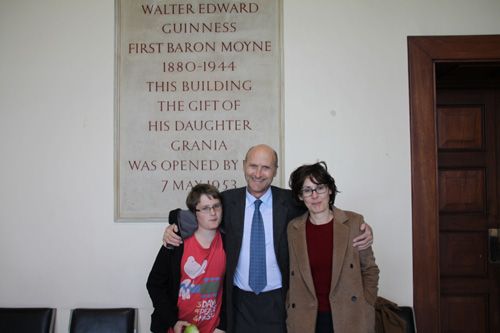Research Laboratories Refurbished at Moyne Institute of Preventive Medicine
Posted on: 27 October 2011
The research laboratories in the east wing of the Moyne Institute of Preventive Medicine, which houses the Department of Microbiology, were recently reopened following an extensive refurbishment project funded in part by a donation of €250,000 from the Normanby Trust. To mark the occasion the chairman of the trust, Constantine Phipps, the Marquess of Normanby, visited the Moyne Institute accompanied by his wife, Nicola and son, Tom. Members of the Department of Microbiology and academic staff who occupy the research laboratories were on hand to demonstrate some of the research conducted in the laboratories.
The refurbished laboratories will house the research of Head of the Department, Dr Ursula Bond, who focuses on yeast, concentrating on industrial yeasts such as those used for making beer and lagers. In one project she is using knowledge gained from genome analysis and transcriptional profiling to understand better how yeasts function during fermentation in the manufacture of beer. Another project aims to modify yeast so that it can use cellulose waste products as a source of sugars for the production of biofuels.

Constantine Phipps, the Marquess of Normanby, with his wife, Nicola and son, Tom at the Moyne Institute of Preventive Medicine.
Lecturer in Microbiology, Dr Alastair Fleming is researching the coordination of cell rest, knows as quiescence, and controlled cell death, known as apoptosis, which represent two processes required for the correct development of organisms. Dr Fleming is using the yeast Saccharomyces cerevisiae as a model organism to study the epigenetic changes that occur during cell growth and cell death, with a view to shedding light on diseases in which these processes are aberrant, including cancer.
Science Foundation Ireland Stokes Professor of Microbial Pathogenesis, Professor Jay Hinton is investigating an exciting new class of small RNA molecules that control the ability of pathogenic Salmonella to cause disease. These bacteria have the unusual ability to survive within macrophages, one of the main types of cell involved in defending humans against microbial attack. Salmonella is responsible for severe gastroenteritis, and one particularly nasty serotype causes typhoid fever.
The Moyne Institute of Preventive Medicine was built in 1953 and was funded by a gift from Constantine's mother, Grania Guinness. Since then the Normanby Trust has funded three extensions to the building, the last being opened in 1995. The memorial plaque in the foyer of the Moyne Institute records the opening of the building in May 1953 in memory of Grania Guinness's father, the first Lord Moyne.
